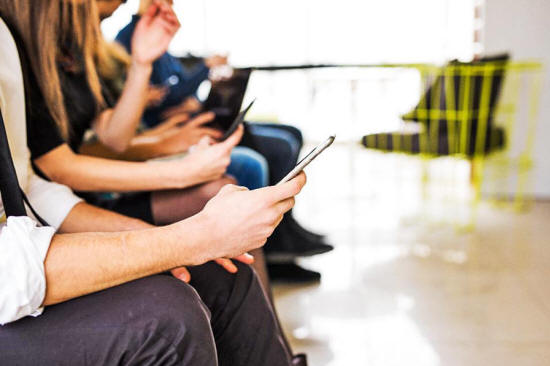|
April 09, 2017 from Forbes Website
Wikipedia Commons
Former Google exec. Tristan Harris, interviewed for the episode, argues that we've been fooled into believing the "technology is neutral" argument.
Instead, he says that software makers have mastered a sort of "addiction code" that keeps people compulsively engaged, such that we can't stand leaving our phones for even a little while.
In other words, the
technology has been manipulated to leverage our
brains' habit-forming tendencies. Tech insiders call it "brain
hacking," and Harris argues that it's destroying our
focus and relationships.
I covered it from several angles in my book, What Makes Your Brain Happy and Why You Should Do the Opposite, and I'm refreshing the arguments for a new edition of the book coming out next year.
With the 60 Minutes story as backdrop, I want to discuss a few of the angles here.
If app makers have mastered a habit-forming "code" that's working overtime on our phones to keep us hooked, what brain dynamics are they tapping?
The most overarching of the dynamics, and the one that gives the others context, is what's known as the brain's reward system - the electro-chemically charged power grid that neurotransmitters surge through when our brains are doing what they're structured to do:
The term "rewards" is
broad in this definition, because anything from learning to speak
French to going on a date to laying money down on a blackjack table
can amount to a reward.
The pro-con nature of the reward system - with the neurotransmitter dopamine driving much of the action - is so central to our lives it's hard to overestimate its importance.
It's at the core of how our brains interact with the world, whether tangible or virtual (it's all the same to your brain).
And since it's the system
that enables habit formation, both good and bad, it's also the
system that those interested in getting you hooked on anything spend
most of their time studying.
Anticipation
The reward system operates via anticipation of rewards, which makes the period between thinking of a reward and receiving it very critical.
Manipulating that period is a key to engaging app design. The ongoing series of intermittent, variable rewards that smartphones serve up are tantalizing to the brain because they so effectively leverage this dynamic.
We're forever anticipating the next little reward, and then the next and the next.
Our attention is captivated by the anticipation of rewards.
We're neurochemically trained to drill down and down for these rewards, through however much mediocrity and nonsense is in the way. To elicit more rewards, we contribute to the reward stream by making our own posts and waiting for a response.
Every time we post
something, we're starting an anticipation stopwatch that works on
the same principle. The jolt might even be more profound because
it's coming from a reward process we initiated, and that's a brain
boost with few equals.
Shutterstock
There's a debate about which model best describes why we get hooked on technologies.
Some think the addiction model fits best, but the problem with that argument is that addictions operate with a distinct pleasure principle. Someone starts using a drug to get the euphoria or other sensations at the other end, whether for pain relief or otherwise.
Over time the drug can't deliver the same way, so more and more is taken to get the effect.
Same for behavioral
addictions like gambling - the gambler wants the high that comes from
taking the risk, but the risk has to get bigger over time to deliver
the same feeling.
We're not talking about overt, panic-level anxiety...
Anxiety is insidious precisely because it's usually not overt, but more like a charged hum in the background that seeps into our thoughts and influences our actions.
Often we react to it
without consciously thinking through why. Smartphones, it turns out,
are short-term anxiety elixirs.
Research on the topic backs up that argument, showing that compulsive smartphone use is tied closely to anxiety, even more so for those with forms of anxiety disorder, which happens to be an enormous and growing segment of the population.
The same conclusions have
been reached by research on problematic internet use in general:
anxiety is a potent precursor.
That makes sense when you consider how our smartphones now fill all of the empty time slots in our days, times we'd otherwise be alone to think. The technology fills the empty space available, and then creeps into spaces already filled with things like conversations with people in front of us.
(The 60 Minutes episode
also pointed out that our phones seem to directly contribute to our
anxiety over time by triggering spikes in the stress
hormone cortisol.)
While the term "FOMO" (Fear of Missing Out) may have started as Urban Dictionary slang, it's an on-the-mark description of a key brain dynamic.
Some psychologists have defined it as,
If we're not connected,
the rewards pass us by and we feel a sense of loss, and we also miss
the opportunity to contribute to the reward stream and anticipate
the rewards we'll receive in response.
When you combine that sense of loss with anxiety, you have the sensation that comes from feeling disconnected, and it really is a form of withdrawal.
Here again we have to be careful with definitions, because withdrawal is mostly associated with the addiction model.
In the anxiety model, we're struck by more and stronger anxiety from feeling disconnected via the digital conduit that keeps us tethered to the world.
It's not the same as addiction withdrawal (especially from chemical addictions), but there are similar elements. When the brain has engaged and established a habit that alleviates anxiety, and that habit is disrupted, then the predictable result is even more anxiety.
Does anyone want to feel
that? No, so the urge to keep our smartphones nearby at all times is
a hedge against feeling anything like it.
For an app to break
through and grab us–to become part of our personal habit matrix–it
must leverage all of these dynamics tied to the brain's reward
system. The most successful of those apps are designed so well, the
effects are seamless.
I'd argue no, for the reasons discussed, but there's no question that we've developed an ever-more compulsive habit of using them to counterbalance stress and anxiety, which are only getting more intense in our pressure-keg culture.
It's the perfect storm of
technology and need fulfillment, and we're all carrying around the
proof in our pockets...
|



